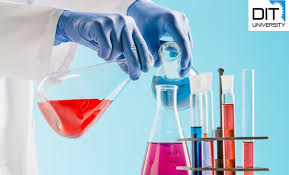
M.Sc Chemistry Admission ,Eligibility, College, Syllabus
- Science
Notification:

Table of Content
A Master of Science or M.Sc in Chemistry is a postgraduate course that aims at having students learn deeper principles of chemistry and techniques. Chemistry is often described as the "major science subject" because it has a deep inter-link with the physical sciences, life sciences and applied sciences. This qualification will give students advanced theoretical knowledge and practical skills in many areas. The job opportunities for them in academia, industry, and research are widely open.
The M.Sc in chemistry course is subdivided into various branches -including organic, inorganic, physical, analytical, and biochemistry. It needs both theoretical knowledge and applied practice by way of laboratory techniques.
| Parameters | MSc Chemistry Details |
|---|---|
| MSc Chemistry Course Level | Postgraduate |
| MSc Chemistry Course Duration | 2 years |
| MSc Chemistry Course Fee | INR 432 - INR 19.94 Lakh |
| MSc Chemistry Admission Process | Entrance-Based |
| MSc Chemistry Eligibility Criteria | A bachelor's degree in either BSc Chemistry or a relevant discipline with a minimum of 50% aggregate score from a recognised university. |
| MSc Chemistry Entrance Exams | CPGET, AP PGCET, CUET PG, URAT PG, IIT JAM, etc. |
| MSc Chemistry Popular Colleges | BHU, JMI, JNU, VIT, IISc, etc. |
| MSc Chemistry Job Profiles | Toxicologists, Clinical Research Associate, Chemist, Pharmacy Assistants, Lab Assistants, etc. |
| MSc Chemistry Average Salary | INR 9.8 LPA - INR 2.1 LPA |
| MSc Chemistry Top Recruiters | Medical Research, Chemical Industries, Manufacturing and Processing Industries, Forensic Laboratories, Oil and Petroleum Industries, Hospitals, etc. |
To enrol in an M.Sc in Chemistry program, candidates typically need to meet certain eligibility criteria:
M.Sc Chemistry Year Wise Syllabus
MSc Chemistry syllabus mainly focuses on topics such as Inorganic Chemistry, Organic Chemistry, Physical Chemistry, Green Chemistry, Polymer Science, Organometallics etc. Listed below in the table is the year-wise MSc Chemistry syllabus.
M.Sc Chemistry First Year Syllabus
Listed below in the table are the first-year semester-wise MSc Chemistry subjects.
| Semester 1 | Semester 2 |
|---|---|
| Inorganic Chains, Rings, and Clusters | Synthetic Strategies and Pericyclic Reactions |
| Stereochemistry and Reaction Mechanism | Spectroscopic Methods in Chemistry |
| Inorganic Semimicro | Qualitative Analysis Lab |
| Group theory and Quantum Chemistry | Thermodynamics and Equilibria |
| Analytical Chemistry | Solid State Chemistry and Materials Science |
| Physical Chemistry Experiments Lab | Inorganic Quantitative Analysis Lab |
| Semester 3 | Semester 4 |
| Bioinorganic and Organometallic Chemistry | Chemistry of Biomolecules |
| Bioorganic and Heterocyclic | Photochemistry |
| Electrochemistry | Green Chemistry |
| Organic Qualitative Analysis Lab | Surface Science and Coating Technology |
| Instrumental Methods of Analysis Lab | Nano-Chemistry and Technology |
| Coordination Chemistry | Kinetics |
| Spectroscopic Identification of Molecules | Industrial Catalysis |
| Organic Quantitative Analysis Lab | Polymer Science |
| Medicinal Chemistry | Bioanalytical Chemistry |
The M.Sc in Chemistry normally takes two years and is organized into four semesters. A semester includes lectures, laboratory practicals, and project activities in the semester. Just like any other college course, it includes both core and elective topics touching on more advanced issues in chemistry.
Lectures are accompanied by practical sessions where students can practice what they learn, as well as acquire basic skills in laboratory work. Most courses expect learners to embark on a research project during the last semester and this culminates in producing a dissertation or thesis.
A Master's in Chemistry provides unlimited opportunities for career exposure in any field.
| TOP COLLEGES | FEES PER ANNUM |
|---|---|
| Indian Institute of Science (IISc) | ₹40,000-₹60,000 |
| IITs | ₹1,00,000-₹2,00,000 |
| University of Delhi | ₹10,000-₹25,000 |
| BHU Varanasi | ₹15,000-₹30,000 |
| Panjab University | ₹10,000 to ₹20,000 |
| Jawaharlal Nehru University (JNU) | ₹20,000-₹30,000 |
After doing an M.Sc in Chemistry, one can opt for the following higher studies:
These postgraduate courses can be made to further improve and enhance the prospects of employment for graduates and help them specialize in areas of interest.
M.Sc chemistry career is very much demanding because of the increasing growth and scientific development. Industries today focus on sustainability and innovation, thereby translating to a large number of opportunities.
M.Sc in Chemistry is a rewarding career and it has potential scope of work in research, development, or academia. This program will fully equip students with diversified career paths while giving them a sense of empowerment to find a place for themselves meaningfully in advancing science and societal contributions. The opportunities available in the field of chemistry in direct employment or further studies are very diversified and have a considerable impact on society. Thus, the field is a very attractive one for aspiring scientists and professionals.
How likely are you to recommend Medicaljagat.com to a friend or a colleague?